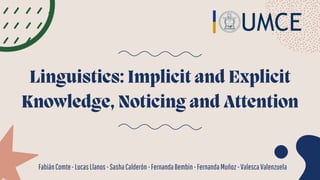
LINGUISTICA.pdf
- 1. Linguistics: Implicit and Explicit Knowledge, Noticing and Attention FabiánComte-LucasLlanos-SashaCalderón-FernandaBembin-FernandaMuñoz-ValescaValenzuela
- 2. Explicit Knowledge and Implicit Knowledge Attention SLA theories of Attention Realizations about Attention Activity Bibliography 03 - 10 11 - 12 13 - 18 19 - 21 22 24 Contents
- 3. Explicit (Declarative) Explicit and Implicit Knowledge *The main difference between those two is awareness. (see Ellis, 1985) Implicit (Procedural) Aware of what we know Not fully aware of what we know
- 4. a) The knowledge about something is often implicit. E.G: How to ride a bike or drive a car. b) If we can tell what we know, that is explicit. E.G: Historical dates, mathematical and grammatical formulas.
- 5. 4 keys parameters to distinguish between each other 01 Consciousness Accessibility Verbalization Orientation 02 03 04 According to Ellis (1985), there are 4 fundamental, differential characteristics:
- 6. Not conscious. Evident in communicative use. Conscious. We know the 'facts'. Consciousness Implicit Knowledge Explicit Knowledge
- 7. Accesibility is inmediate. Automatic processing. Accessibility is slow. Controlled proccesing. Automatic and Controlled proccesing definitions were taken from Brown's 'Sorting through Perspectives on SLA' (Pag. 292) Accesibility Implicit Knowledge Explicit Knowledge
- 8. Cannot be verbalized (Ellis, 1988) Enables performance (Brown, Deals with complex rules (Robinson, 2012) Spontaneous language production. Native speakers have a natural language. Verbalization Implicit Knowledge " (...) cannot be verbalized unless it is made explicit; learners cannot tell what they know implicitly." (Ellis, 1988)
- 9. Often verbalized (Ellis, 1988) 'Conscious' facts > declarative knowledge (Brown, Deals with simple rules (Robinson, 2012) No role in language for real communication (Robinson, 2012) Fluent automatic knowledge = implicit knowledge (Robinson, 2012) Explicit Knowledge "(...) is often verbalizable; learners can report what they know. This calls for knowledge of the metalanguage needed to talk about language." (Ellis, 1988) Verbalization
- 10. "(...) when learners are oriented towards encoding or decoding the meaning of messages in communication." (Ellis, 1988) Orientation Implicit Knowledge Adaptative system of an elaborate neural network (Ellis, 1988) Human ability for language to formulate explicit content (Ellis, 1988) A basis to develop deductively explicit representations (Brown,
- 11. Orientation Explicit Knowledge " (...) when learners are formulating and monitoring sentences to ensure they conform to target language norms or because they lack implicit knowledge." (Ellis, 1988) Learner's processing capacity. Facilitation of automatic production (Ellis, 1988) Encodes of semantic or grammatical meaning (Ellis, 1988)
- 12. Regarding on L1 and L2 usage When it comes to language usage, we rely on both types of knowledge. Everyday conversation Mostly on implicit. Academic writing Might require explicit knowledge in order to perform. E.G:
- 13. Native Speakers L2 Learners Develop full procedural knowledge Some remarkable brief approaches 1) Regarding Anderson's Adaptive Control of Thought (ACT) Declarative and Procedural Knowledge. Differences the type of knowledge typically developed between L1 and L2. Rely more on declarative knowledge
- 14. Attention What is Attention? Schmidt (2001) Posner and Petersen (1990): Alertness Orientation Detection
- 15. Key concepts of attention of Schmidt (2001) Attention is limited Attention is selective Attention is subject to voluntary control Attention controls acess to consciousness Attention is essential for the control of action Attention for learning
- 16. Two SLA theories of Attention
- 17. Richard Schmidt's Noticing Hypothesis (1990) What is "The Noticing Hypothesis"? Perception v/s Noticing "While learners may be able to percieve elements in the input without conscious attention, they will be not able to process this information for storage in long-term memory unless they consciously attend to it"
- 18. Richard Schmidt's Noticing Hypothesis (1990) Let put us in context... How did the idea of "Noticing" was originated? Two studies of Mr. Schmidt... First case: Adult learner of English unable to notice his own mistakes... Second case: Schmidt own experience learning Portuguese.
- 19. Richard Schmidt's Noticing Hypothesis (1990) Strong and Weak version of "The Noticing Hypothesis" Strong version: We ONLY learn if we consciouly attend. Weak version (2010): We not learn MUCH about the things we dont attend to.
- 20. Tomlin and Villa's Theory of Attention Two important claims: a. Three distinct attentional processes: ALERTNESS, ORIENTATION, and DETECTION. b. Detection can take place without alertness and orientation
- 21. The two theories... These theories are oppositional? Tomlin and Villa: Attention does not require consciousness. Schmidt: Consciousness is necessary for attention. Alertness Orientation Incidental Learning Intentional Learning
- 22. 07. Realizations
- 23. Realizations about attention Apperception Objects of attention Noticing theory The role of attention for output Noticing Individual differences of attention
- 24. 08. Activity
- 25. Activity Explain these objects and how do you know it.
- 27. The Noticing Hypothesis In Language Theories. (2022, February 27). Edubirdie. Retrieved June 10, 2022, from https://edubirdie.com/examples/the-noticing-hypothesis-in- language-theories/ Nguyen Thi Phuong Nhung. “Noticing Hypothesis in Second Language Acquisition.” IOSR Journal of Humanities and Social Science (IOSR-JHSS), 25(6), 2020, pp. 26-30. Ellis, R. (1985). Understanding second language acquisition, pp. 193- 194. Bibliography
- 28. Robinson, P. and Ellis, N. (2008). Handbook of cognitive linguistics and second language acquisition. New York: Routledge/Taylor and Francis Group, pp.205, 206. Al-Hejin Bandar (2012) Attention and Awareness: Evidence from Cognitive and Second Language Acquisition Research. Teachers College, Columbia University Working Papers in TESOL & Applied Linguistics, Vol. 4, No. 1. Attention and Awareness